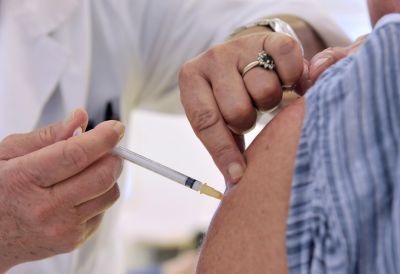Britons reluctant to have swine flu vaccine: poll

Many Britons are refusing to have swine flu vaccinations because of concerns about side effects and the general perception that it is a mild illness, a newspaper for doctors reported on Wednesday.
A survey of 107 general practitioners (GPs) by Pulse newspaper reported particular difficulties persuading pregnant women to have the vaccine, with one GP estimating as few as one in 20 were happy to go ahead.
Experts believe pregnant women are particularly at risk from the A(H1N1) virus.
More than 100 people have died from the virus in Britain, although the overwhelming majority had underlying health problems.
The British government has set a target of vaccinating 50.7 percent of patients aged from six months to 65 years in clinical at-risk groups, but GPs fear they will fall short of the target.
Just 37 percent of respondents said they believed the target was realistic, based on their experience of offering the vaccine to patients so far, and others reported problems with the delivery of supplies.
Dr Gary Calver, a GP in Folkestone, southeast England, said: "A number of patients were very negative about having swine flu vaccination. It's going to be extremely difficult to meet targets."
Another GP, Ian Pace, from Lincolnshire, eastern England, told Pulse: "We start tomorrow but with only 500 vaccines available to us there is not a cat's chance in hell of vaccinating all the target group."
The editor of Pulse, Richard Hoey, said the government had failed to sufficiently make its case for the benefits of the vaccine.
"Many patients, like a substantial number of doctors, are unconvinced there is sufficient evidence that swine flu vaccination is safe and necessary.
"The government needs to be much clearer about the safety data it has gathered on the vaccine so far," he said.
More than 5,700 people have died worldwide since the virus was first discovered in April, with most deaths in the Americas, according to the World Health Organization.
gj/tha/mjs
Subscribe to Independent Premium to bookmark this article
Want to bookmark your favourite articles and stories to read or reference later? Start your Independent Premium subscription today.

Join our commenting forum
Join thought-provoking conversations, follow other Independent readers and see their replies